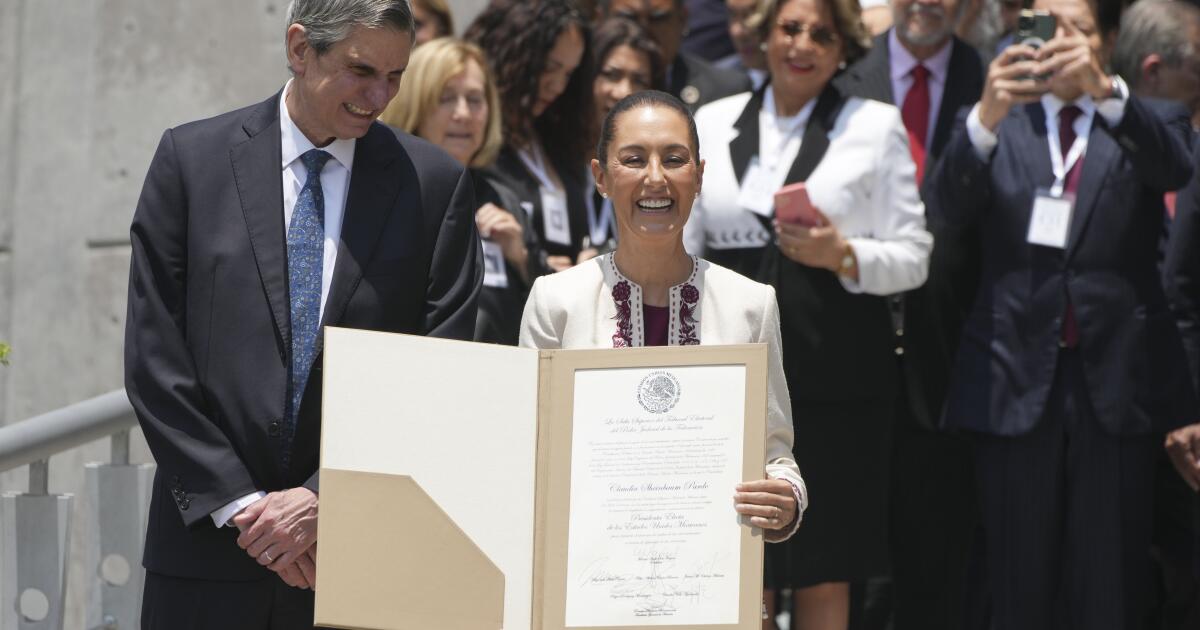MEXICO CITY —
More than two months after her election, Claudia Sheinbaum received on Thursday from the authorities of the Electoral Tribunal of the Judicial Branch of Mexico the certificate that accredits her as president-elect after the validation of the vote on June 2.
The process represents the last step that Sheinbaum had to follow before her inauguration on October 1, when she will assume office as the first female president of Mexico for the period 2024-2030.
Upon receiving the certificate of majority vote, Sheinbaum celebrated that her election took place in the midst of a “peaceful, democratic and free” day and recalled that the mandate given to her by the majority of Mexicans was to continue and advance the political project that President Andrés Manuel López Obrador began in 2018.
“No one should fear,” said Sheinbaum, assuring that she will govern with a “broad sense” of justice and will not allow “corruption or privileges” to return.
The president-elect took the opportunity to outline the axes of her security policy and confirmed that it will be similar to that of the outgoing government in addressing the causes of violence. “I committed myself during the electoral process to continue building peace, addressing the causes and reducing impunity, and the people approved it with their vote. We will do it with strategy. The war against drugs will not return,” she said.
Mexican President-elect Claudia Sheinbaum holds the official document certifying her as the winner of the presidential election as she leaves the Federal Electoral Tribunal, in Mexico City, Thursday, Aug. 15, 2024.
(Fernando Llano/AP)
During his six-year term, López Obrador gave the Armed Forces a more prominent role in public security tasks, despite criticism from humanitarian organizations that demanded that the police be strengthened, but he avoided a more open confrontation with the powerful drug cartels in order to distance himself from the policy of former President Felipe Calderón (2006-2012), who promoted a frontal fight against these criminal organizations.
“Mexico has broken the glass ceiling,” said the head of the Electoral Tribunal, Mónica Soto, applauding the arrival of a woman to the presidency. In a speech, Soto lamented the deaths that occurred during the electoral process and recalled that “violence, polarization and hatred undermine democracy and freedoms.”
Before the start of the event, supporters of Sheinbaum and the opposition gathered outside the Electoral Tribunal in the south of the Mexican capital, which generated moments of tension.
While a group of pro-government protesters shouted slogans in favour of the future president, an opponent from the opposite sidewalk responded through a loudspeaker: “It’s a lie, it’s not true, nothing has been resolved.”
The electoral authorities delayed issuing the certificate of majority of votes and the declaration of validity of the elections because the Superior Chamber of the court had to previously discuss several appeal actions, which included more than two hundred non-conformity lawsuits against district counts and a process in which the nullity of the election was requested, according to that instance in a statement.
All claims were dismissed and Sheinbaum was confirmed as the winner of the presidential election, receiving 35.9 million votes, representing 59.76% of the votes cast, the Electoral Court said in unanimously declaring the validity of the victory of the candidate of the ruling Morena party.
Sheinbaum won by more than 30 percentage points over her closest rival, Senator Xóchitl Gálvez, a candidate from an opposition coalition.
Gálvez filed a challenge to the process with the Electoral Court, alleging that López Obrador intervened in the elections and that public resources were used in favor of Sheinbaum.
